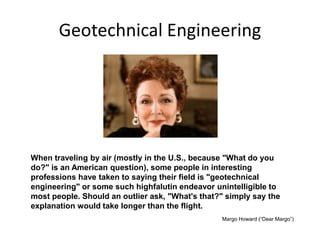Getting My Geotheta To Work
Getting My Geotheta To Work
Blog Article
Little Known Facts About Geotheta.
Table of ContentsUnknown Facts About GeothetaAn Unbiased View of GeothetaGeotheta Fundamentals ExplainedGeotheta - TruthsThe Greatest Guide To Geotheta

They carry out website investigations, accumulate examples, perform laboratory tests, and examine information to assess the suitability of the ground for building and construction projects - Consulting Engineers. Based on their findings, geotechnical engineers supply referrals for foundation design, slope stability, maintaining frameworks, and reduction of geotechnical hazards. They collaborate with other experts, such as designers, architectural designers, and building and construction groups, to ensure that geotechnical factors to consider are incorporated into the overall project style and application
By analyzing the actions and residential or commercial properties of soil and rock, they can determine prospective geotechnical risks such as landslides, soil settlement, or incline instability. Their proficiency helps avoid failures or accidents that can jeopardize lives and residential or commercial property. Here are some detailed responsibilities and responsibilities of a geotechnical engineer: Website Examination: Geotechnical engineers conduct site investigations to collect data on subsurface conditions.
They translate the information to recognize the properties and behavior of the soil and rock, including their strength, leaks in the structure, compaction qualities, and groundwater conditions. Geotechnical Analysis and Style: Geotechnical engineers evaluate the data gathered throughout website investigations to examine the security and suitability of the site for building jobs. They carry out geotechnical computations and modeling to assess elements such as bearing capacity, negotiation, incline stability, lateral earth stress, and groundwater circulation.
All About Geotheta
Foundation Design: Geotechnical engineers play an important duty in creating foundations that can securely sustain the designated framework. They assess the soil conditions and tons requirements to figure out the appropriate foundation kind, such as superficial structures (e.g., footings), deep structures (e.g (https://www.find-us-here.com/businesses/Geotheta-Alexandria-Alabama-USA/34113488/)., piles), or specialized methods like soil enhancement. They take into consideration elements such as settlement restrictions, bearing capacity, and soil-structure communication to develop ideal foundation layouts
They assess building and construction plans, screen website activities, and conduct area inspections to validate that the style suggestions are adhered to. If unpredicted geotechnical problems arise, they evaluate the scenario and give suggestions for removal or adjustments to the layout. Risk Assessment and Mitigation: Geotechnical designers assess geotechnical dangers and threats connected with the task site, such as landslides, liquefaction, or dirt erosion.

Partnership and Interaction: Geotechnical engineers function closely with other professionals associated with a job, such as engineers, structural designers, and building and construction groups. Effective communication and collaboration are vital to incorporate geotechnical considerations right into the overall job design and construction process. Geotechnical engineers offer technical experience, solution queries, and guarantee that geotechnical requirements are met.
A Biased View of Geotheta
Below are some kinds of geotechnical designers: Structure Designer: Foundation designers focus on developing and examining foundations for structures. They assess the soil conditions, load needs, and site characteristics to figure out the most ideal structure type and design, such as superficial structures, deep foundations, or specialized techniques like stack structures.
They examine the variables influencing incline security, such as dirt buildings, groundwater conditions, and slope geometry, and create techniques to avoid incline failings and minimize dangers. Quake Designer: Earthquake designers concentrate on evaluating and designing frameworks to hold up against seismic forces. They evaluate the seismic danger of a website, assess dirt liquefaction capacity, and create seismic design requirements to make sure the safety and strength of structures throughout quakes.
They do field screening, accumulate examples, and analyze the collected information to characterize the soil residential or commercial properties, geologic formations, and groundwater problems at a site. Geotechnical Instrumentation Designer: Geotechnical instrumentation designers focus on surveillance and determining the actions of soil, rock, and structures. They install and keep instrumentation systems that check variables such as soil settlement, groundwater levels, slope movements, and architectural variations to assess performance and provide early warnings of potential problems.
The Single Strategy To Use For Geotheta
They conduct tests such as triaxial examinations, loan consolidation tests, straight shear tests, and leaks in the structure examinations to collect information for geotechnical evaluation and design. Geosynthetics Designer: Geosynthetics engineers focus on the layout and application of geosynthetic products, such as geotextiles, geogrids, and geomembranes. They make use of these materials to improve soil security, reinforce inclines, supply drain remedies, and control disintegration.
They have a tendency to be investigative individuals, which implies they're intellectual, introspective, and investigative. They wonder, systematic, sensible, logical, and logical. Some of them are also social, suggesting they're kind, charitable, cooperative, client, caring, practical, compassionate, sensible, and friendly. Does this audio like you? Take our cost-free occupation examination to discover if geotechnical designer is just one of your leading profession suits.
In the workplace setting, geotechnical engineers make use of specialized software application tools to do computations, develop styles, and assess information. They prepare records, review task specs, communicate with clients and employee, and coordinate task tasks. The office setup supplies a conducive setting for study, analysis, and collaboration with other specialists associated with the job.
What Does Geotheta Mean?
They often his comment is here go to project sites to carry out website examinations, analyze geotechnical conditions, and collect information for analysis. These sees entail taking a trip to various places, sometimes in remote or challenging terrains. Geotechnical designers might carry out dirt tasting, conduct tests, and screen construction tasks to make certain that the geotechnical aspects of the project are being executed correctly.
Geotechnical designers additionally work in specialized geotechnical laboratories. In these centers, they carry out experiments, execute examinations on soil and rock samples, and examine the design residential or commercial properties of the products. Geotechnical research laboratory designers work thoroughly in these environments, handling screening devices, running instruments, and tape-recording information. They collaborate with various other lab team to make certain precise and reputable testing results.
Report this page